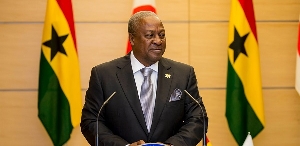The decision to include loss and damage financing as an item to be discussed by countries participating in the 27th conference of parties to the United Nations Framework Convention on Climate Change (COP 27) in Egypt is progressive.
The concept of loss and damage is for countries, which have contributed the most to climate change with their planet-warming emissions to pay poorer countries to recover from the resulting disasters.
The kilometres of roads, culverts and bridges that are washed away by severe floods due to high volume of rains are examples of loss and damage caused by climate crisis.
The inclusion of loss and damage financing to the agenda is a crucial prerequisite for making progress on addressing the issue, which will be the most consequential negotiation topic at the UN climate talks.
Dr Henry Kwabena Kokofu, the Executive Director of the Environmental Protection Agency (EPA), told the Ghana News Agency that the establishment of an independent fund to compensate for loss and damage was one of the top priorities of developing counties.
The Executive Director who described the move as a breakthrough said countries incurring losses due to climate impact could have a discussion and push for real action and results on loss and damage.
He stated that, “we need to see a clear commitment to finance loss and damage distinct from the $100 billion agreed annual climate finance.”
Dr Kokofu, who represented the Presidency of the Climate Vulnerable Forum, said COP27 must deliver for Africa and the most vulnerable.
There is a call for the process to conclude within two years and should not involve liability and compensation.
Developing countries and small Island states have been pressing for the funds since 1991 when the Pacific Island Vanuatu first proposed a plan for high-emitting countries to channel money toward those impacted by sea level rise.
It took more than a decade for the proposal to gain momentum, even as much of Vanuatu and other small island Pacific nations are slowly disappearing.
President and Chief Executive Officer, World Resources Institute, said: “At long last, providing funding to address losses and damages from climate impacts is on the agenda of the UN climate negotiations. With climate impacts devastating communities all around us, the international community can no longer avert its eyes from the deadly and costly consequences of a warming world.”
“Vulnerable nations have tirelessly appealed for help to cope with the alarming and damaging climate impacts that they hold little responsibility for causing. Today, countries cleared an historic first hurdle toward acknowledging and answering the call for financing to address increasingly severe losses and damages,” he said.
“We applaud the Egyptian presidency for accelerating this discussion to start the climate negotiations in Sharm El-Sheikh on the right foot."
“It is encouraging that countries agreed to a verbal statement that notes this process will reach a conclusive decision on funding arrangements within two years. Now negotiators need to set clear markers to ensure this process moves quickly, ideally concluding by next year given the urgency of the crisis,” he added.
Mr Dasgupta said: “Getting funding to address loss and damage on the agenda is only the first step. We still have a marathon ahead of us before countries iron out a formal decision on this central issue for CO27 and it is critical that all countries work together in good faith to get this done.”
Click to view details



Business News of Wednesday, 9 November 2022
Source: GNA

















